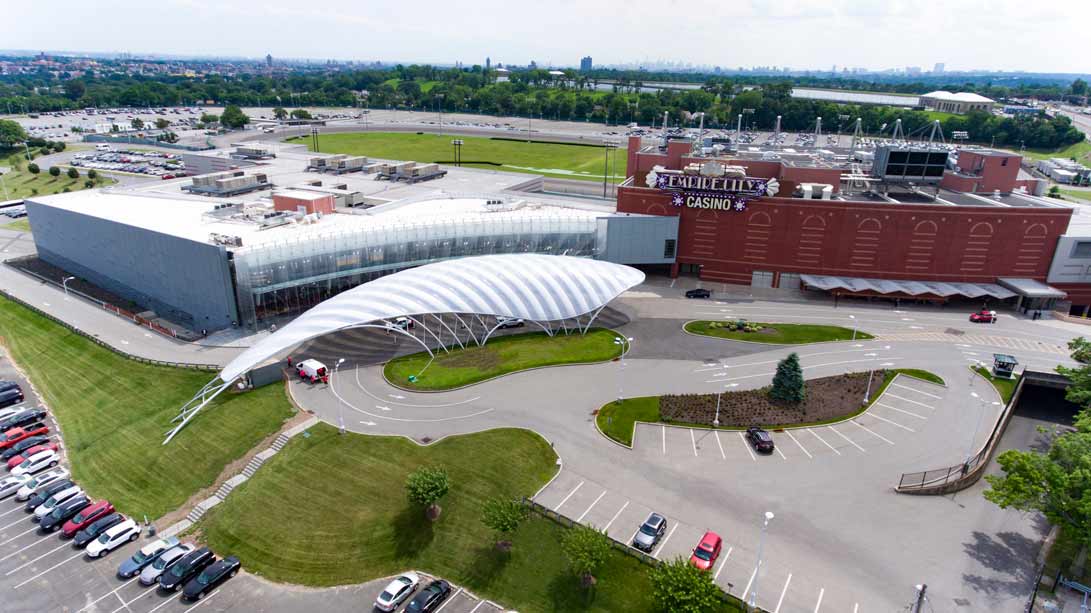MGM Resorts International betting on a full casino license in Yonkers

Uri Clinton, the president and CEO of Empire City Casino in Yonkers, which is owned and operated by MGM Resorts International, hopes Empire City receives a full-casino license from New York state in a year or two instead of having to wait for the 2023 expiration of a moratorium on downstate full-casino licenses, which has the effect of helping protect upstate casino operations from downstate competition.
Only after receiving a full commercial casino license could Empire City also be licensed for sports betting. The New York State Gaming Commission recently published in the state register its new sports betting rules, which puts them into play for holders of full-casino licenses.
“We”™re seeking to accelerate downstate gaming, which would allow us to make more meaningful investments in this property,” Clinton told the Business Journal during an interview on June 21, his first with area news media since his appointment as president and CEO. “The state would derive tremendous benefits economically as well as providing new entertainment venues. There is a question on the process, a question on the timing, and people want to make sure that the constituents downstate are part of the overall discussion.”

MGM bought Empire City and Yonkers Raceway from longtime owners the Rooney family for approximately $850 million. The transactions were completed on Jan. 29 of this year. Empire City has a video lottery terminal license, or VLT, from the gaming commission. A full commercial casino license would enable it to bring in live table gaming in addition to expanding the types of machines in use. With a full commercial license, it would be eligible to receive a sports betting license from the state.
“It would happen pretty quick,” Clinton said. “We have one of the largest gaming floors of any casino in North America. We”™ve got about 180,000 square feet of gaming space. It”™s certainly the largest gaming floor in the MGM portfolio. It certainly has the ability to have 100 or more table games. We”™re already wired to put in the Vegas-style slot machines. Sports betting ”” we”™ve got a racetrack (Yonkers Raceway), which makes a great backdrop to a sports betting facility. We just think that on this current footprint we could get up and going pretty fast.”
Once Empire City made a transition to become a full commercial casino with sports betting, its handle, the amount of money that visitors bet, could be expected to dramatically increase, although Clinton declined to estimate what that figure might be. Empire City has estimated that another 2,829 jobs would be created on top of the 1,200 already at the Yonkers facility, which would add about $130 million to the current $45 million annual payroll. “Why would we wait until 2023 when we can do that right now and have the economic development now that the state can use?”
MGM is active in the sports world through team ownership, sponsorships and sports betting. In New Jersey its “playMGM Casino & Poker” online gaming platforms and mobile apps are licensed and regulated by that state”™s Division of Gaming Enforcement. The New York Jets named MGM Resorts International its official gaming partner as did Major League Baseball and the National Basketball Association.
Empire City Casino on June 20 announced it has become the presenting sponsor of the New York Streets, a National Arena League football team. The Streets play home games at the Westchester County Center in White Plains. “We own the (Las) Vegas Aces, which is a WNBA (Women”™s National Basketball Association) team and so this is just simply a continuation of MGM”™s approach to integrating itself with sports and entertainment,” Clinton said.
According to documents obtained by the Business Journal from the gaming commission, Empire City visitors played a total of $10,042,805,935 in cash, vouchers and credits during the fiscal year ended March 31, 2019. That included $90,620,629 in free play promotions. Prize payouts were worth $9,346,194,729, about 93% of what was played.
The “net win,” which is the net revenues remaining after payout of prizes to players, was $605,990,576. Empire City received $187,857,079 as its “agent commission,” defined as the portion of the “net win” paid to the casino operator as compensation for operating the gaming facility. It also received $48,479,246 as a “marketing allowance” used to finance the costs of advertising, marketing and promoting video lottery play at the casino. Other allocations included lottery administration and an award for capital expenses.
The amount which went to the State Education Fund to be used for direct aid to education was $306,555,194. The City of Yonkers received $19,600,000 from the Office of the State Comptroller as its annual municipal aid payment for being the video lottery gaming facility”™s host. The municipal aid payments are dedicated to defraying local costs associated with a video lottery gaming facility, to reduce real estate property taxes or to increase support for public schools.
In April and May of 2019, Empire City handled a total of $1,732,227,106 worth of wagering, which produced $53,377,594 for the State Education Fund, according to gaming commission documents.
“We know we can do better than that for the state and for the cities,” Clinton said. “The table game revenues would be significant, the different types of slot machines, going from VLT slot machines to what we call random number-generated slot machines, more Vegas-style slot machines. That revenue lift is pretty significant on the same footprint.”
Clinton pointed out that the Empire City and Yonkers Raceway property covers 97 acres and said that more can be done to enhance the facilities without expanding the existing acreage, such as adding a concert venue, a covered multistory parking garage and, perhaps, a hotel.
“Once you have the full license you would need more amenities in order to make sure that you are providing a true entertainment option so that people could come and choose restaurants,” he said. “People could come and have concert tickets and go see a show. People could come and dance. They could partake on the gaming floor. They might go and enjoy themselves in a variety of ways. A lot of that is predicated, though, on having the new revenue streams to support it and that comes from the full gaming license.”
Obtaining a full commercial casino license also would help differentiate Empire City from a new VLT casino location in the Woodbury Common area in Orange County. On June 20, the state Legislature approved moving a VLT license held by Empire Resorts from Monticello Raceway in Sullivan County to the site of a former chemical plant, which would be repurposed. Clinton said there are a lot of unknown variables that still need to be worked out regarding the move, and Empire remains focused on developing a process to bring a full commercial casino to Yonkers.
Clinton is no novice when it comes to casino operations. He”™s been in the gaming industry for about 17 years. He joined MGM Resorts as vice president and deputy general counsel and was quickly promoted to senior vice president and legal counsel. He served as senior vice president for global development for the company. His previous experience included positions with Baha Mar Ltd., Multimedia Games, Inc. and Caesars Entertainment Corporation. He holds a bachelor”™s degree in political science from the University of Nevada, Las Vegas, a law degree from Gonzaga University School of Law in Spokane, Washington, and an MBA from Vanderbilt University in Nashville.
Clinton said when he got to Yonkers he was impressed by the quality of employees at Empire City. “There are 1,200 employees,” he said. “Many of them have been here over five years. There”™s a true family feel.” He said MGM has been working to improve the quality of the work experience for the employees. “What we understand in the hospitality industry is that once you do that you are improving the quality of the hospitality experience for your guests,” he said. “We were also looking at who were the community stakeholders. We wanted to make sure that we started meeting (with them) right away. We met with so many neighborhood groups, Chamber of Commerce, community organizations. We want to make sure that when we ultimately do start generating new revenues that the entire community is proud of what”™s happening and they view this facility as a quality corporate employer and corporate citizen.”